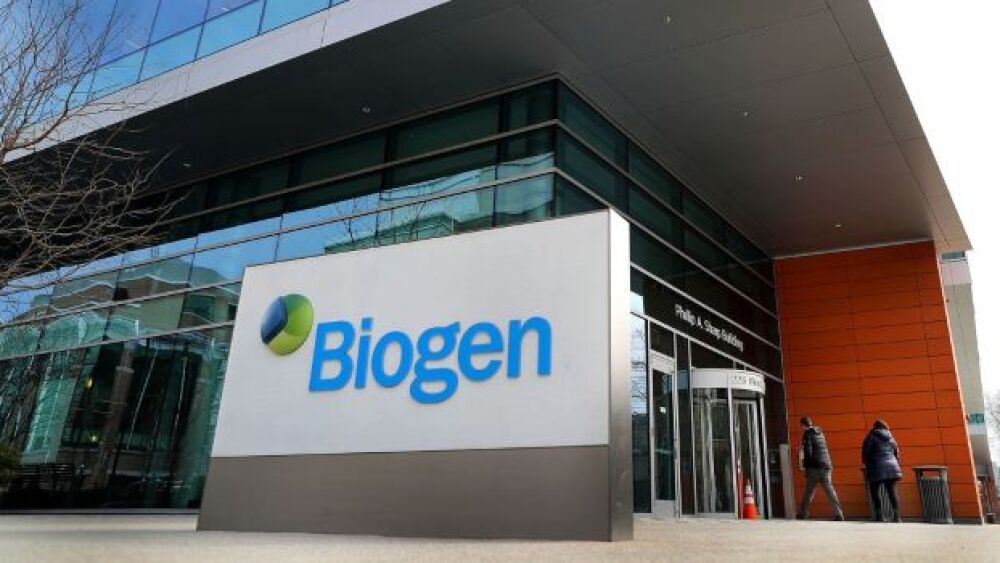Biogen CEO Michel Vounatsos admitted Thursday that the company’s rollout of Aduhelm (aducanumab) for Alzheimer’s disease has been “slower than we anticipated.”
John Tlumacki/The Boston Globe via Getty Images
Michel Vounatsos, chief executive officer of Biogen, admitted Thursday that the company’s rollout of Aduhelm (aducanumab) for Alzheimer’s disease has been “slower than we anticipated.” Although this shouldn’t have come as a surprise, company shares dropped 10% by the close of the market yesterday. Vounatos was speaking at the Morgan Stanley 19th Annual Global Healthcare Conference.
Vounatsos noted that only about 50 healthcare centers in the U.S. have provided at least a single dose of Aduhelm to date. The controversial drug was approved on June 7, 2021.
Vounatos argued that the slow start was related to “confusion, misinformation, and controversy” over the drug and its approval by the U.S. Food and Drug Administration (FDA).
The FDA approved Aduhelm against the recommendation of its own Peripheral and Central Nervous System Drugs Advisory Committee, which voted against recommending it in November 2020. Three members of the panel resigned in protest. The agency also utilized an Accelerated Approval pathway, which requires follow-up studies for continued approval. It was based on a surrogate endpoint, clearance of beta-amyloid, instead of relief of symptoms. The advisory committee had asked if the agency planned on using surrogate endpoints and was told the agency did not expect to do so.
Also, the drug has a price tag of approximately $56,000 per patient per year. Although nowhere near being the most expensive drug on the market, the number of Alzheimer’s patients in the U.S. exceeds 3 million. Biogen and the FDA have since modified the drug’s label to early-stage disease, but that’s a very high expense for a large population of patients, most of which would be on Medicare. The Centers for Medicare and Medicaid Services (CMS) have not completed their review of their drug pricing strategy for Aduhelm.
Previous reports showed that uptake of the drug was slow. For example, the Veterans Health Administration (VHA) argued there isn’t enough evidence of clinical benefit to justify widespread use. In addition, several insurers, such as UnitedHealth Group Inc., which is the largest private insurer supplying Medicare Advantage to seniors, indicated they are waiting for more information from Medicare.
“Mainly because of the uncertainty around insurance coverage … most doctors and systems are in a holding pattern,” said Anton Porsteinsson, M.D., director of the University of Rochester Alzheimer’s Disease Care, Research and Education Program. Porsteinsson’s facility is only using the drug in the context of clinical trials.
Vounatsos indicated that the company has a plan to address each of the issues raised, but that time and patience will be required. “Society is adjusting to this big news,” he said. “And we’ve seen some of the extreme reactions—that I will not comment on. We as Biogen remain focused on the patients, the customers, making progress,” and working on getting the drug to more patients by the end of the year.
Biogen’s Alisha Alaimo, president of the company’s U.S. commercial operations, indicated “steady progress” was being made on the drug’s commercial launch. She also noted that some physicians are reluctant to treat patients with the drug until clinical trial data has been published in a peer-reviewed journal. The company indicates the papers have been submitted and reviewed but didn’t offer a timeline for publication.
The controversy continues, with members of Congress demanding information from Biogen and the FDA about the drug’s approval. A House committee is conducting an investigation, announced by Rep. Carolyn Maloney (D-NY), chair of the House Committee on Oversight and Reform, and Rep. Frank Pallone, Jr. (D-NJ), chair of the Committee on Energy and Commerce.
The Department of Health and Human Services’ Office of Inspector General is running an investigation into the FDA’s fast-track pathway for approval. In July, Janet Woodcock, acting commissioner of the FDA, asked the OIG to investigate how the FDA and representatives of Biogen interacted before the approval.
At the time, Woodcock wrote, “I believe that it is critical that the events at issue be reviewed by an independent body such as the Office of the Inspector General in order to determine whether any interactions that occurred between Biogen and FDA review staff were inconsistent with FDA policies and procedures.”
The earliest calls for an investigation revolved around the relationship between the head of the agency’s neuroscience division, Billy Dunn, and Biogen executives. In early June, STAT reported the company had an informal meeting with Dunn in May 2019, asking him for support for aducanumab. Then in June 2019, Dunn and the FDA proposed accelerated approval for aducanumab, contradicting the agency’s previous statements about that process.





